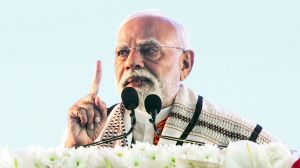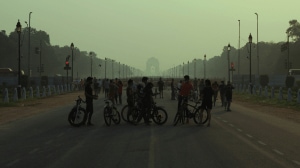At village chosen for nuclear site, fission’s already started
DAROLI (PATIALA), JANUARY 23: Last Thursday, the gurudwara in Daroli village in Patiala district, was converted into a place of protest. O...

DAROLI (PATIALA), JANUARY 23: Last Thursday, the gurudwara in Daroli village in Patiala district, was converted into a place of protest. One hundred agitated villagers met to decide their future, the future of their land, their village. Daroli has been chosen as the site for a nuclear power plant, and villagers have already launched a struggle to ensure the project doesn’t get off the ground.
Even as the Punjab State Electricity Board (PSEB) awaits the final nod from the Nuclear Power Corporation (NPC) site selection panel, locals have set up a 15-member sangharsh committee to resist any move to acquire land for the project.
The PSEB’s own site selection committee zeroed in on Daroli after sifting through data from nine sites. According to PSEB chairperson G.S. Sohal, “After examining several sites in the state, we have finally settled on Daroli. I visited the village last week and an NPC team is expected to examine the site within the next month,” The team will not be examining any other site in the state.
The village got wind of plans to acquire 2,500 acres for the project only after Sohal’s visit. “We have been hearing reports about a site near Patran (five kilometres away) but only last week did we realise it was our village,” said ex-sarpanch Jit Singh.
That realisation spawned fear faster than you can say nuclear fission. Alternative employment, compensation, rehabilitation became the topmost concerns for the villagers. Almost everyone assembled at the sangharsh committee’s meeting had the same questions on their minds: “Why didn’t the government take us into confidence at any stage? Don’t we have any choice in the matter?”
“This village was settled by refugees from Gujranwala and Sheikupura in Pakistan. When we came here, the area was a jungle. We paid the government to clear it; a Russian firm using giant bulldozers did the work in the 1950s. We have now turned the jungle into fertile farmland and they want us to move,” says Amrik Singh, a member of the sangharsh committee.
“It is not just a question of compensation. We have built up a community here over 54 years. Will they move the whole village together? Where is the land for that in Punjab? And if they give us compensation what are we going to do? Most of us are uneducated, farming is all we know,” adds Gurdip Singh.
Sohal’s defense was ; the price of development has to be paid, and someone has to pay it. “There are always some elements who are anti-development and exploit local sentiments. Sufficient compensation will be paid. In fact, short of shifting the site we will pay heed to whatever apprehensions the villagers have. We hope not to include the village itself in the project area and we can consider special facilities such as land for land or a lump sum and one job per family,” he says.
But residents point out that if they lose their land, they cannot stay on in the village. In fact, landless labourers were among those who attended the meeting. “We are not qualified to work at the plant. If the land is taken away who will we work for? At least here we have a home. Moreover, we have built on village common land and we will get no compensation,” says Lakhwinder Singh.
Sohal admits that the lack of a resettlement and rehabilitation policy in Punjab is a problem. “Our State does not have such a policy. If we don’t explain what we are doing people feel shunted out.”
On the villagers’ complaint that they hadn’t been consulted, he said, “ We can’t start interacting without preliminary selection. Perhaps, instead of one site, a few more should have been shortlisted. But now nothing can be done. To start all over again would mean another two to three years and Punjab can’t wait that long for power.”






- 01
- 02
- 03
- 04
- 05

























